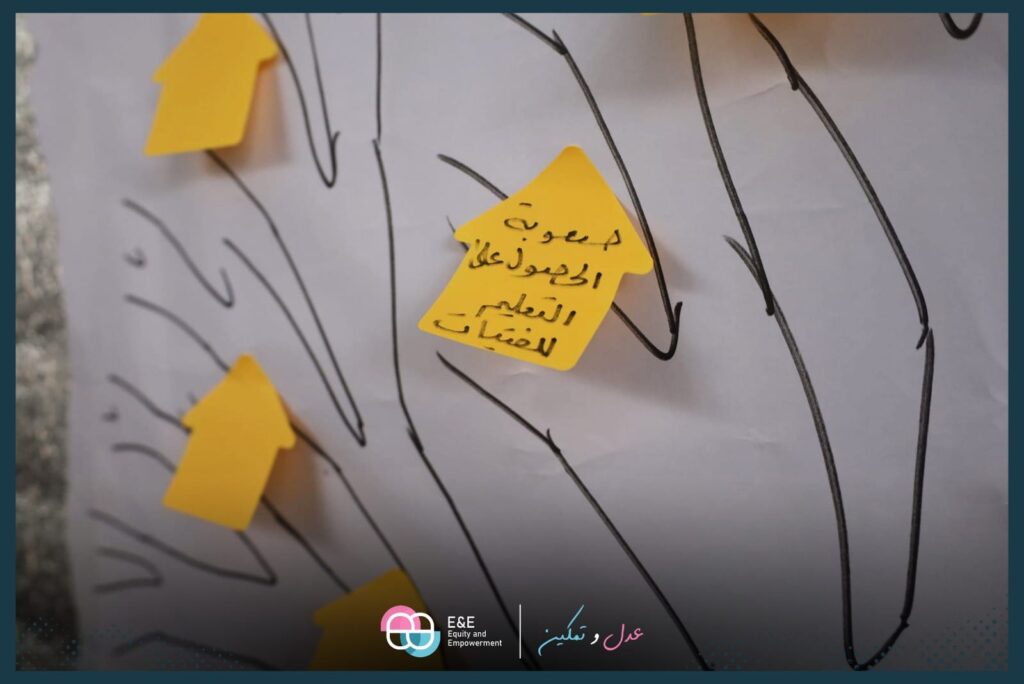
As part of the 16 Days Campaign to combat gender-based violence, Equity and Empowerment organization held a session for women in the organization’s center in Kafrtakharim, focusing on digital violence and protection methods. A similar session was held with women in the Al-Auja camp, where they were asked about the types of violence they face, their stories, and the reasons behind the violence. Some of the responses were:
These are some of the experiences and stories of women in the context of gender-based violence in its various forms. Equity and Empowerment stress that the first step toward eliminating this violence is encouraging women to raise their voices, using women’s bodies and organizations to amplify their voices, support feminist institutions, and strengthen their work.
Campaign Story:
The 16 Days Campaign against Gender-Based Violence is an annual campaign that starts on November 25, the International Day for the Elimination of Violence against Women, and runs until December 10, Human Rights Day. The campaign aims to raise awareness about gender-based violence and strengthen global efforts to eliminate it. It includes awareness activities and community initiatives focused on empowering women and girls and providing support to survivors of violence.
Historical Background:
On November 25, 1960, the three Mirabal sisters—Patria, Minerva, and María Teresa—were killed by the police in the Dominican Republic. These political activists opposed the brutal, systematic violence of the country’s dictator. The Mirabal sisters became symbols of feminist resistance. In 1980, the UN declared November 25 a day to end violence against women in Latin America. The UN officially recognized this International Day in 1999.
UN statistics show that 40% of women worldwide have experienced gender-based violence at some point in their lives, with this percentage increasing during times of crisis. Furthermore, over two-thirds of women who experience violence are unable to access help.
The first step toward eliminating gender-based violence is encouraging women to speak up, working through women’s organizations to amplify their voices, and supporting feminist institutions to enhance their work.
Empowering women through training, campaigns, and raising awareness about the different forms of violence and their severe impacts on women is a crucial part of this effort.
As part of the 16 Days Campaign to combat gender-based violence, Equity and Empowerment organization held a session for women in the organization’s center in Kafrtakharim, focusing on digital violence and protection methods. A similar session was held with women in the Al-Auja camp, where they were asked about the types of violence they face, their stories, and the reasons behind the violence. Some of the responses were:
These are some of the experiences and stories of women in the context of gender-based violence in its various forms. Equity and Empowerment stress that the first step toward eliminating this violence is encouraging women to raise their voices, using women’s bodies and organizations to amplify their voices, support feminist institutions, and strengthen their work.
Campaign Story:
The 16 Days Campaign against Gender-Based Violence is an annual campaign that starts on November 25, the International Day for the Elimination of Violence against Women, and runs until December 10, Human Rights Day. The campaign aims to raise awareness about gender-based violence and strengthen global efforts to eliminate it. It includes awareness activities and community initiatives focused on empowering women and girls and providing support to survivors of violence.
Historical Background:
On November 25, 1960, the three Mirabal sisters—Patria, Minerva, and María Teresa—were killed by the police in the Dominican Republic. These political activists opposed the brutal, systematic violence of the country’s dictator. The Mirabal sisters became symbols of feminist resistance. In 1980, the UN declared November 25 a day to end violence against women in Latin America. The UN officially recognized this International Day in 1999.
UN statistics show that 40% of women worldwide have experienced gender-based violence at some point in their lives, with this percentage increasing during times of crisis. Furthermore, over two-thirds of women who experience violence are unable to access help.
The first step toward eliminating gender-based violence is encouraging women to speak up, working through women’s organizations to amplify their voices, and supporting feminist institutions to enhance their work.
Empowering women through training, campaigns, and raising awareness about the different forms of violence and their severe impacts on women is a crucial part of this effort.